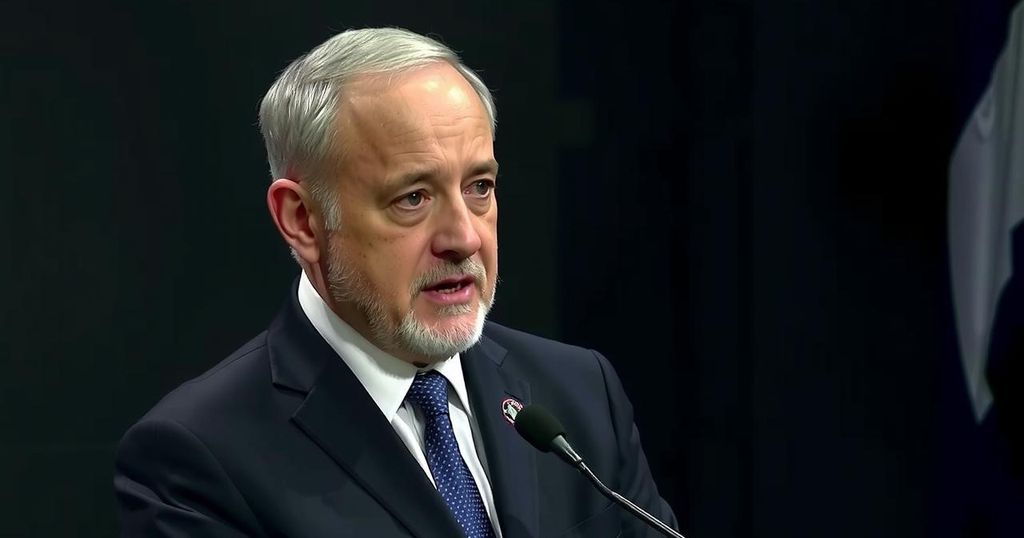Biden Denounces ICC Arrest Warrants for Netanyahu Following Gaza Conflict

President Biden denounced the ICC’s arrest warrants for Israeli leaders as “outrageous.” The warrants, linked to alleged war crimes during the Gaza conflict, drew backlash from global leaders, including Hungary’s Orban, who pledged to invite Netanyahu despite the ICC’s decision. Meanwhile, Iran’s Revolutionary Guards deem the warrants a blow to Israel’s legitimacy, further complicating the geopolitical landscape of the Middle East.
U.S. President Joe Biden has expressed his strong opposition to the International Criminal Court’s recent arrest warrants for Israeli Prime Minister Binyamin Netanyahu and former Defense Minister Yoav Gallant, calling the warrants “outrageous.” The ICC issued these warrants alongside one for Hamas leader Mohammad Deif, citing allegations of war crimes committed during the recent Gaza conflict. In response, Biden affirmed the U.S. commitment to Israel, highlighting the absence of equivalence between Israel’s military actions and those of Hamas. Meanwhile, Iranian Revolutionary Guards chief General Hossein Salami characterized the arrest warrants as signaling the “end and political death” of Israel, underscoring the heightened tensions in the region.
In contrast, Hungary’s Prime Minister Viktor Orban announced his intent to invite Netanyahu to visit, labeling the ICC’s move as “brazen” and asserting Hungary’s disregard for the court’s decision. China has also weighed in, urging the ICC to maintain impartiality and fairness in such sensitive matters. Amid this diplomatic turmoil, Israel continues its military operations in Gaza, claiming the elimination of several Hamas militants. These events illustrate the complex interplay of international relations, national security, and legal accountability in the context of the ongoing conflict in the Middle East.
In the background of these developments, the ICC has faced criticism from several international players, who argue that its actions may undermine Israel’s right to self-defense against threats posed by terrorist organizations such as Hamas and Hezbollah. Argentina’s President Javier Milei echoed this sentiment, stating that the ICC’s warrants disregarded Israel’s legitimate security concerns. The situation also coincides with tensions surrounding Iran’s nuclear program, where the head of the Atomic Energy Organization announced the launch of advanced centrifuges in response to recent IAEA criticisms. As hostilities escalate and diplomatic dialogues shift, the international community remains divided on the implications of these legal actions on the wider Middle Eastern conflict.
The International Criminal Court (ICC), based in The Hague, has recently issued arrest warrants alleging war crimes against high-ranking Israeli officials during the Gaza conflict. This action has provoked significant diplomatic responses, particularly from the United States, which has reiterated its stance of unconditional support for Israel’s right to defend itself. The warrants against Netanyahu, Gallant, and Hamas leader Mohammad Deif are framed within a broader context of ongoing tensions and military actions in the region, particularly as Israel conducts operations against Hamas in response to past attacks. The varying responses from global leaders illustrate the multifaceted nature of the political and legal challenges surrounding the conflict, particularly regarding issues of sovereignty, self-defense, and international law.
The issuance of arrest warrants by the ICC against Israeli leaders has sparked a significant diplomatic backlash, particularly from the United States and its allies. President Biden’s condemnation of the warrants highlights his administration’s unwavering support for Israel, while leaders from Iran and Hungary express starkly different views. As military operations continue in Gaza, coupled with rising tensions surrounding Iran’s nuclear ambitions, the situation remains precarious, underscoring the complexity of navigating justice and accountability in international relations amidst ongoing conflict.
Original Source: www.france24.com








